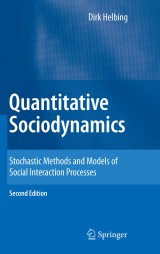Details

Quantitative Sociodynamics
Stochastic Methods and Models of Social Interaction Processes2nd ed. 2010
|
96,29 € |
|
| Verlag: | Springer |
| Format: | |
| Veröffentl.: | 15.11.2010 |
| ISBN/EAN: | 9783642115462 |
| Sprache: | englisch |
| Anzahl Seiten: | 333 |
Dieses eBook enthält ein Wasserzeichen.
Beschreibungen
When I wrote the book Quantitative Sociodynamics, it was an early attempt to make methods from statistical physics and complex systems theory fruitful for the modeling and understanding of social phenomena. Unfortunately, the ?rst edition appeared at a quite prohibitive price. This was one reason to make these chapters available again by a new edition. The other reason is that, in the meantime, many of the methods discussed in this book are more and more used in a variety of different ?elds. Among the ideas worked out in this book are: 1 • a statistical theory of binary social interactions, • a mathematical formulation of social ?eld theory, which is the basis of social 2 force models, • a microscopic foundation of evolutionary game theory, based on what is known today as ‘proportional imitation rule’, a stochastic treatment of interactions in evolutionary game theory, and a model for the self-organization of behavioral 3 conventions in a coordination game. It, therefore, appeared reasonable to make this book available again, but at a more affordable price. To keep its original character, the translation of this book, which 1 D. Helbing, Interrelations between stochastic equations for systems with pair interactions. Ph- icaA 181, 29–52 (1992); D. Helbing, Boltzmann-like and Boltzmann-Fokker-Planck equations as a foundation of behavioral models. PhysicaA 196, 546–573 (1993). 2 D. Helbing, Boltzmann-like and Boltzmann-Fokker-Planck equations as a foundation of beh- ioral models. PhysicaA 196, 546–573 (1993); D.
and Summary.- Dynamic Decision Behavior.- Stochastic Methods and Non-linear Dynamics.- Master Equation in State Space.- Boltzmann-Like Equations.- Master Equation in Configuration Space.- The Fokker-Planck Equation.- Langevin Equations and Non-linear Dynamics.- Quantitative Models of Social Processes.- Problems and Terminology.- Decision Theoretical Specification of the Transition Rates.- Opinion Formation Models.- Social Fields and Social Forces.- Evolutionary Game Theory Game theory!evolutionary|bb .- Determination of the Model Parameters from Empirical Data Empirical experience|bb .
<p>This new edition of Quantitative Sociodynamics presents a general strategy for interdisciplinary model building and its application to a quantitative description of behavioral changes based on social interaction processes. Originally, the crucial methods for the modeling of complex systems (stochastic methods and nonlinear dynamics) were developed in physics and mathematics, but they have very often proven their explanatory power in chemistry, biology, economics and the social sciences as well. Quantitative Sociodynamics provides a unified and comprehensive overview of the different stochastic methods, their interrelations and properties. In addition, it introduces important concepts from nonlinear dynamics (e.g. synergetics, chaos theory). The applicability of these fascinating concepts to social phenomena is carefully discussed. By incorporating decision-theoretical approaches, a fundamental dynamic model is obtained, which opens new perspectives in the social sciences. It includes many established models as special cases, e.g. the logistic equation, the gravity model, some diffusion models, evolutionary game theory and social field theory. Moreover, it implies numerous new results and is relevant for various application areas, such as opinion formation, migration, the self-organization of behavioral conventions, and the behavior of customers and voters. Theoretical results are complemented and illustrated by numerous computer simulations.</p><p>Quantitative Sociodynamics is relevant both for social scientists and natural scientists who are interested in the application of stochastic and synergetics concepts to interdisciplinary topics. </p>
Unified and comprehensive overview of stochastic methods to describe quantitatively behavioral changes based on social interaction processes. Presents numerous applications of the theoretical concepts. New chapters on Dynamic Decision Behavior, Optimal Self-Organization, Self-Organization in Space and Induced by Fluctuations, Drift- or Fluctuation-Induced Ordering and Self-Organization in Driven Many Particle Systems.

















